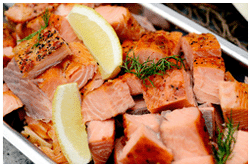 It is widely acknowledged that the positive health effects from consuming seafood for pregnant women is greater than the potentially harmful effects.
It is widely acknowledged that the positive health effects from consuming seafood for pregnant women is greater than the potentially harmful effects.For example, the World Health Organization (WHO) together with FAO in 2011 calculated that fatty fish during pregnancy boosts the baby’s IQ by about five points, despite the fact that the fish also contain contaminants. Hence, they recommend pregnant women to consume seafood during pregnancy, especially for the sake of the child's brain development.
Studies from England reveal that children of mothers who consumed more than 340 grams of seafood a week, showed better verbal skills than children of mothers who consumed less seafood. This is partly due to the fact that the brain needs the omega-3 fatty acids EPA and DHA to develop in a healthy and normal matter.
Nevertheless, the amount of contaminants young women ingest can affect the development of the child. Monitoring results from NIFES reaffirms that seafood from Norwegian waters are generally safe, with few exceptions. The food authorities has already given dietary advice regarding these exceptions.
Back in 2006 The Norwegian Scientific Committee for Food Safety (VKM) concluded that the Norwegian population should eat more seafood. It is also recommended that children and pregnant women increase their intake of seafood.
Important for Mum
In addition, research shows that it is important for the mother herself to consume seafood during pregnancy. Mothers with low omega-3 levels during pregnancy are more likely to develop symptoms of postpartum depression. The main source of omega-3 in our diet is fatty fish such as salmon, trout, herring and mackerel.
Contaminant Levels Down in Farmed Salmon
The amount of sum dioxins and dioxin-like PCBs in farmed salmon have declined in recent years, and is currently lower than in mackerel and herring. For a person that weighs 70 kg, a dinner serving with farmed salmon (200g) will fill only 10 percent of the tolerable weekly intake (TWI) of dioxins and dioxin-like PCBs. This is considered to be low.





